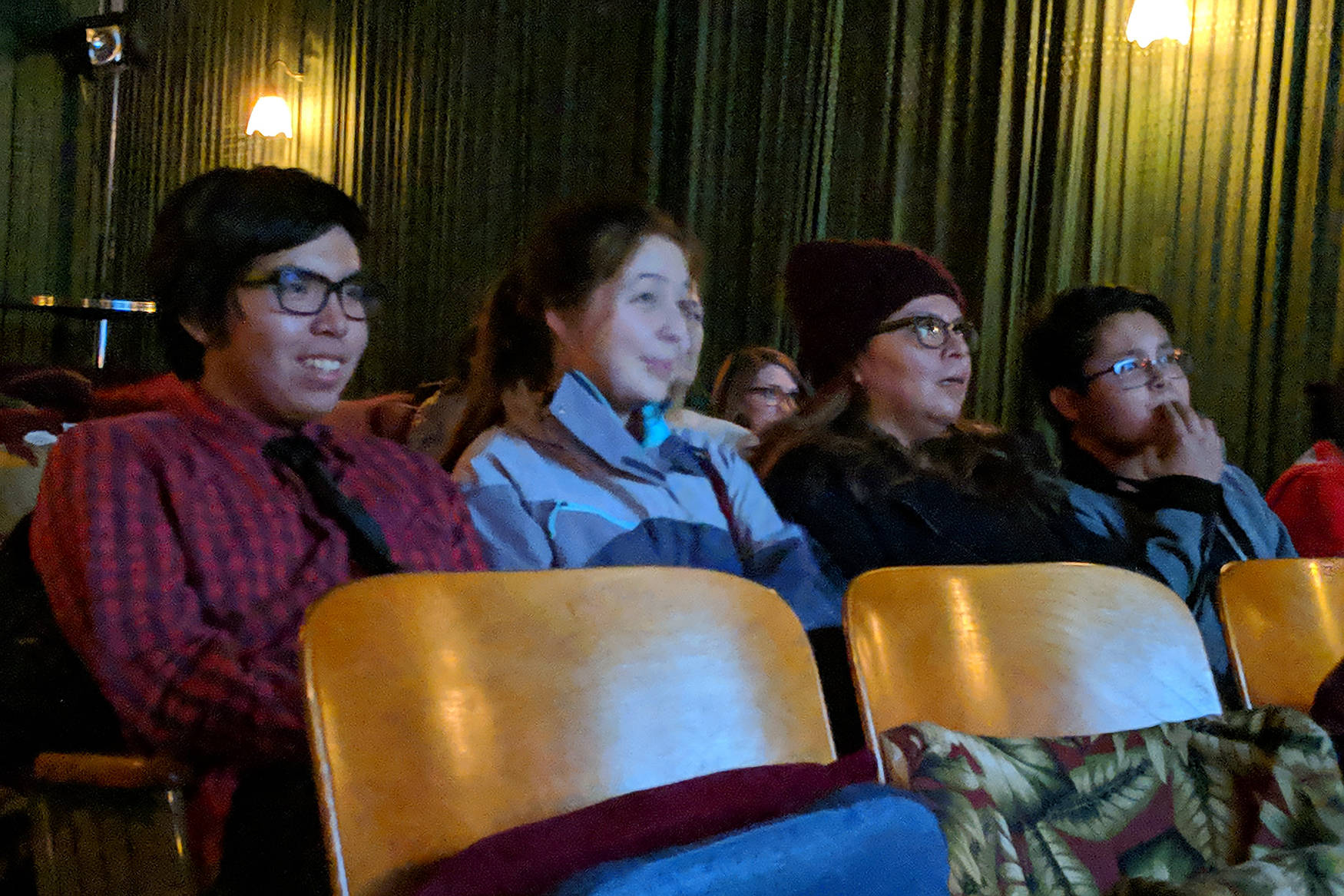Short films by young filmmakers presented snapshots into four different worlds.
A screening of “Our Alaskan Stories” films made by Michael Martin Jr., Haley Shervey, Alyssa Afcan and Andrea Cook Saturday night at the Gold Town Nickelodeon, presented the world as seen through the lens of Mt. Edgecumbe High School upperclassmen who have since graduated.
While the boarding school is in Sitka and the student films were shown through the Island Institute of Sitka’s Tidelines residency, the films and filmmakers represent disparate views and backgrounds.
Martin’s film focused on his connection to his Tlingit culture, Shervey’s focused on a study of the Klawock watershed, predation and its impact on subsistence, Afcan’s was a representation of what Yup’ik life is like in Nunum Iqua and Cook’s showed Haida people connecting their culture and was set to a poem she wrote.
“It has a lot of rhyming, but I promise it has meaning,” Cook said.
Her film, “Paddling to Shore,” was named after a metaphor inspired by canoes in a poem she wrote about Haida culture.
“We were at land with our language, with our culture and we were pushed out to sea,” said Cook, who is a student at University of Alaska Southeast and is from Hydaburg.
Afcan said she hoped “Yuuyaraq,” which means “our human way of life,” accurately portrayed just that in her distant home.
“My hometown is a lot different from places in the Southeast,” Afcan said. “The trees here, you can make totem poles with, the trees at home, you could probably make a good marshmallow skewer.”
Martin, who lives in Juneau but hunts and fishes in Hoonah, showed his family hunting, fishing and preparing food with a variety of shots, footage speeds and a self-made soundtrack.
Martin said when he made “Adapt,” he was feeling guilty for being culturally disconnected, but as he made the film he felt more connected with his Tlingit heritage and the guilt was replaced by pride.
“I’m a cynical person,” Martin said. “The Northern Lights are just proof the sun is trying to kill us and all of that. Through the lens of a camera, I was able to see the beauty of my way of life.”
When he wants to feel reconnected with his culture, Martin said he watches a video of his great-grandmother dancing, and he often catches himself singing Tlingit songs to himself.
Shervey’s interest in fish, wildlife and science permeated her work. The young artist who currently resides in Portland, Oregon, and is from Craig said she’s torn between her interest in art and science.
“I’m really struggling with that right now,” Shervey said.
However, all the filmmakers said in response to an audience question, that art can be used to promote science and illuminate findings that impact Alaskan ways of life.
Gina Cole, a lawyer-turned-writer from New Zealand traveling with the filmmakers added another voice to the evening with a reading from “0.001,” a work from her book “Black Ice Matter,” a collection of short stories prominently featuring glaciers and climate change.
Cole delivered opening remarks in the Tlingit language Lingít, Fijian, Tongan and Māori.
Despite different perspectives and backgrounds, there was a noticeable commonality among the films.
“When we saw all our films, we said, ‘All these movies are about fish,” Afcan said. “Subsistence is important to all of our cultures.”
What’s next?
In the immediate future, the four young filmmakers will travel to Gustavus and Sitka via the Alaska Marine Highway System to show their movies.
However, the more distant future is something the young adults are coming to terms with, especially where filmmaking is concerned.
Cook and Martin both made short films after their “Our Alaskan Stories,” but Martin was the only member of the group who resoundingly said he will continue making movies.
“I’m working on a bunch of things right now,” Martin told the Capital City Weekly before the screening. “I’ve been writing scripts. I’ve been buying a lot of gear.”
“Our Alaskan Stories” is not available online, but the movies may be added to YouTube.
During a question and answer segment that lasted about as long as the roughly 45-minute screening, Martin said his dream would be to start a production company in Southeast Alaska and make films that show life outside of “frickin’ ‘Alaskan Bush People.’”
Afcan said at some point she’d like to make a movie about Yup’ik ghost stories and oral traditions.
“There are a lot of stories we like to tell our children to scare them out of doing things that will harm them,” Afcan said.
All the filmmakers said they would like to retain a connection to home, but not everyone said they were certain to stay there. Afcan became misty-eyed while discussing the possible necessity of leaving her village behind for a career.
“There’s not many jobs in the village,” Afcan said. “I could be a teacher, a substitute teacher, I could work in the store or I could fish commercially, but that’s getting harder. Probably, the way I’ll get through it is lots of calls home.”
Shervey said that question is commonplace for peers from their home state.
“I think it’s a big question for young people in Alaska,” Shervey said. “Do you want to leave home?”
Cook said she plans to remain in Southeast because that’s where the art she would like to make thrives. Cook said she would like to pursue carving, or formline, the prominent Northwest art form, like her grandfather.
“It’s who I am,” Cook said. “I heard some weird comments about carving because I’m female, but some of the best weavers I’ve known have been men.”
• Contact arts and culture reporter Ben Hohenstatt at (907)523-2243 or bhohenstatt@juneauempire.com.

